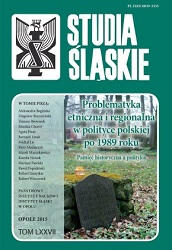Determinanty polityki etnicznej państwa polskiego po 1989 r.
The determinants of ethnic politics of the Polish state after 1989
Author(s): Tomasz BrowarekSubject(s): Politics / Political Sciences, History and theory of political science, Inter-Ethnic Relations
Published by: Instytut Śląski
Keywords: Poland;ethnic politics;minority rights
Summary/Abstract: Many factors as well as external and internal conditions had an essential impact on the contemporary ethnic politics of the Polish state. The most significant determinants are the systemic-institutional, legal, historical-social, economic, as well as ethno-demographic and ideological-political. The article analyzes them in terms of their importance and impact after 1989. The determinants from the first three mentioned groups had the greatest influence, which resulted mainly from the fact that Poland strived to democratize the system and integration with the Western world, through interposing the principle concepts of the rule of law and the protection of human rights. Furthermore, the country was obliged to develop a rapport with national minorities and their native states to protect against any possible ethnic conflict. Therefore, the Polish state accepted and undertook to comply with the international standards for the protection of minority rights. This politics was entangled in historical problems on both sides from the beginning. In such a situation a united stance of the Polish political scene on this issue was essential. Thus, despite frequent changes of governments in the Third Republic, the issue of maintaining the cultural identity of minorities, combating ethnic discrimination and disseminating openness and tolerance were the fundamental principles of their activities and thus they were not the subject of current disputes.
Journal: Studia Śląskie
- Issue Year: 2015
- Issue No: 77
- Page Range: 15-35
- Page Count: 21
- Language: Polish

